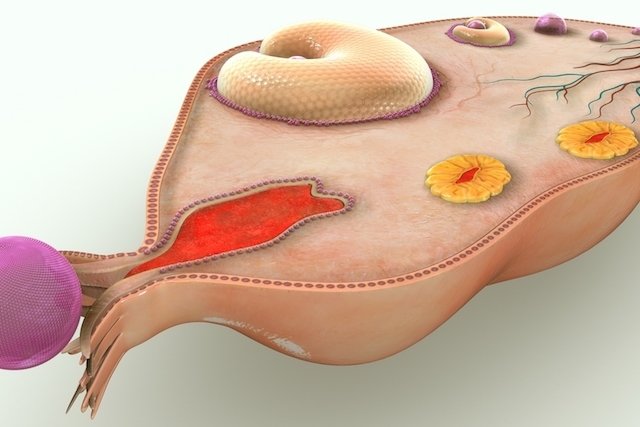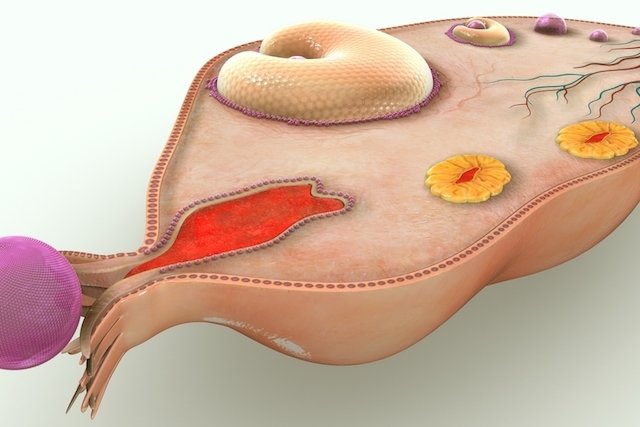Progesterone is a hormone, produced by the ovaries, which plays a very important role in the pregnancy process, being responsible for regulating a woman’s menstrual cycle and preparing the uterus to receive the fertilized egg, preventing it from being expelled by the body.
Normally, progesterone levels increase after ovulation and remain high if there is a pregnancy, so that the body keeps the walls of the uterus developing and does not produce an abortion. If there is no pregnancy, the ovaries stop producing progesterone and the lining of the uterus is destroyed and eliminated naturally through menstruation.
Decreased normal progesterone levels can result in fertility problems in the woman trying to get pregnant, or serious consequences, such as ectopic pregnancy or miscarriage, in the pregnant woman.

When to take a progesterone test
Progesterone testing is generally indicated for women with:
- Risky pregnancy;
- Irregular menstruation;
- Difficulty getting pregnant.
This test is normally carried out during prenatal consultations and can be repeated several times if the pregnant woman presents a decrease in values between each consultation.
Although it can be used in pregnancy, this type of test is not used to confirm whether there is a pregnancy, and the most accurate and recommended test is the beta hCG test. See how and when the beta hCG test should be done.
Progesterone reference value
Progesterone levels in the blood vary according to the woman’s stage of life and menstrual cycle:
- Start of menstruation: 1 ng/mL or inferior;
- Before ovulation: inferior to 10 ng/mL;
- 7 to 10 days after ovulation: superior to 10 ng/mL;
- In the middle of the menstrual cycle (ovulation): 5 to 20 ng/mL;
- First trimester of pregnancy: 11 to 90 ng/mL
- Second trimester of pregnancy: 25 to 90 ng/mL;
- Third trimester of pregnancy: 42 to 48 ng/mL.
Whenever there is a change in progesterone levels, the result must be evaluated by a doctor in order to understand whether it is a normal change or whether it may be caused by a health condition.
high progesterone
Progesterone is considered high when its value is greater than 10 ng/mL, which may be a sign of:
- Ovulation, being considered normal, since during this period the high concentration of progesterone helps prepare the uterus to receive the fertilized egg;
- Ovarian cysts;
- Excessive functioning of the adrenal glands;
- Ovarian or adrenal gland cancer.
In cases where the increase in progesterone is not related to ovulation and preparation of the uterus, the doctor may recommend carrying out blood tests or ultrasound to assess whether there are changes that could confirm the presence of any of these problems.
To ensure that progesterone levels are correct, the woman should not be taking any progesterone pills for 4 weeks before the test.
Low progesterone
When the progesterone value is less than 10 ng/mL, the production of this hormone is considered low. As a consequence of the decrease in progesterone, a woman may experience:
- Weight gain;
- Frequent headache;
- Sudden changes in mood;
- Decreased libido;
- Irregular menstruation;
- Heat waves;
- Difficulty getting pregnant, as the concentration of this hormone is not sufficient to prepare the uterus for pregnancy, resulting in menstruation with the elimination of the fertilized egg.
Furthermore, the progressive decrease in progesterone levels may indicate that the woman is entering the climacteric period and, subsequently, menopause, since at this stage there is less ovarian activity, resulting in less secretion of female sex hormones.
Low progesterone during pregnancy
Low progesterone during pregnancy, especially during the first months, increases the risk of miscarriage or may be indicative of an ectopic pregnancy, making it necessary to initiate appropriate treatment to avoid health complications. If the decrease in this hormone occurs towards the end of the second trimester of pregnancy, there is a greater risk of premature birth.
How to prepare for the exam
Preparing for the progesterone test is very important to ensure that the results are correct and are not being influenced by other factors. Therefore, to take the exam it is recommended:
- Inform the doctor about all medications that you are taking;
- Stop using progesterone pillssuch as Cerazette, Juliet, Norestin or Exluton;
- Avoid taking X-rays up to 7 days before;
Furthermore, it is also important to take the test around 7 days after ovulation, as this is the period when levels are naturally highest. However, if the doctor is trying to assess progesterone levels outside of ovulation, to assess whether they remain high throughout the cycle, it may be necessary to do the test before ovulation, for example.
How to correct progesterone levels
Treatment to correct progesterone levels is normally only carried out when the amount of the hormone is lower than normal and is carried out using progesterone tablets, such as Utrogestan, especially in the case of women who have difficulty getting pregnant. In pregnant women at high risk of miscarriage, progesterone is normally injected directly into the vagina, by the obstetrician or gynecologist.
However, before starting treatment, the doctor must repeat the test again to confirm the result and exclude other factors that could be reducing progesterone levels, such as having eaten before or being in another phase of the menstrual cycle, for example.
In most cases, this type of medication is taken for 10 consecutive days and after the 17th day of the menstrual cycle, being resumed with each cycle. The duration of treatment and medication doses must always be carefully calculated for each case, and a doctor’s advice is essential.
Possible side effects of treatment
The use of hormones, such as progesterone, can bring some side effects to the body, such as weight gain, generalized swelling, fluid retention, excessive tiredness, discomfort in the breast area or irregular menstruation.
Additionally, some women may also experience increased appetite, frequent headaches, fever and difficulty sleeping. This type of medicine should be avoided in people with arterial diseases, depression, breast cancer, vaginal bleeding outside the menstrual period or liver disease.
How to increase progesterone levels naturally
Since progesterone is a hormone produced naturally by the body, there are some precautions that can increase its concentration in the body, such as:
- Drink turmeric, thyme or oregano tea;
- Increase your intake of foods rich in vitamin B6, such as steak liver, banana or salmon;
- Take a magnesium supplement, with guidance from a nutritionist;
- Prefer foods with a high amount of protein;
- Eat a diet rich in vegetables, fruit and dark leafy vegetables, such as spinach;
Furthermore, opting for organic foods can also help with the production of progesterone, since the chemicals used in packaged foods can harm the body’s ability to produce hormones.

Sign up for our newsletter and stay up to date with exclusive news
that can transform your routine!
Warning: Undefined array key "title" in /home/storelat/public_html/wp-content/plugins/link-whisper-premium/templates/frontend/related-posts.php on line 12
Warning: Undefined array key "title_tag" in /home/storelat/public_html/wp-content/plugins/link-whisper-premium/templates/frontend/related-posts.php on line 13




